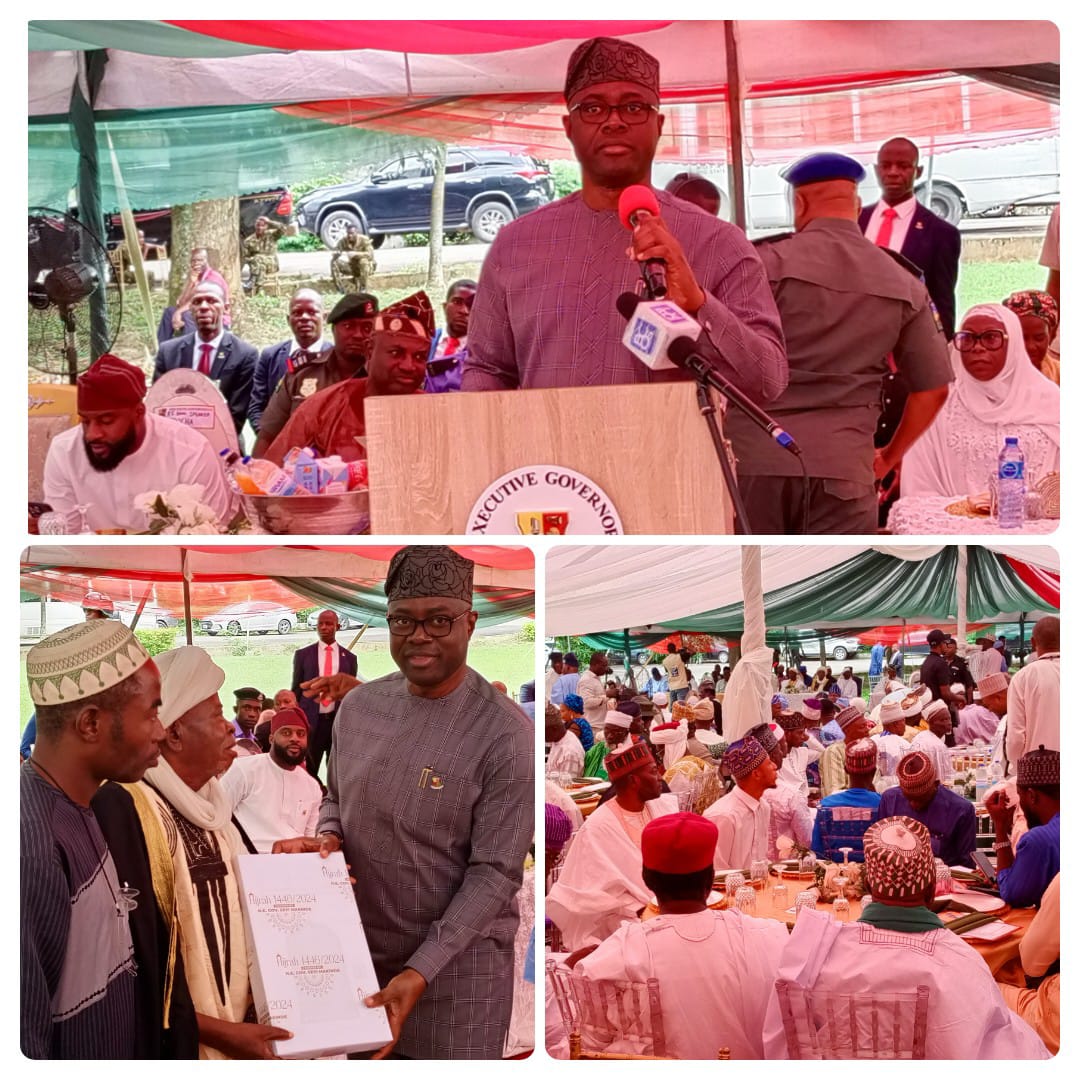In commemoration of Hijrah 1446, Governor Seyi Makinde of Oyo State on Wednesday hosted Muslim leaders and the Islamic community to a luncheon at the Government House in Ibadan.
This was as the Governor reaffirmed his commitment towards completion of the ongoing project at the Ibadan Airport now named Ladoke Akintola Airport to provide aesthetics and other infrastructure. He emphasized that the next Hajj in 2025 will airlift Pilgrims from the Ibadan airport straight to Saudi Arabia.
The event, held on July 24 at the Agodi, marked an important occasion on the Islamic calendar, symbolizing the migration of Prophet Muhammad from Mecca to Medina.
The luncheon, attended by prominent Islamic scholars, Muslim leaders, and representatives from various Islamic organizations across the state including the state’s League of Imam and Alfas, served as a platform for dialogue and fellowship.
Governor Makinde while also commending the Chairman, Oyo state Pilgrims Welfare Board, Alhaji Hazeem Atere for his impressive performance since his appointment, used the occasion to reaffirm his commitment to promoting unity and understanding among all religious communities in Oyo State, while emphasizing the significance of peaceful coexistence and mutual respect in advancing the course of socio-economic development.
He emphasized that his government being a responsible and responsive government will continue to pursue its programs and policies in the best interest of the people of Oyo state. He also commended the Hajj and Pilgrims Welfare Board for the smooth and successful 2024 Hajj to the holy land without any report of any challenge throughout the entire exercise.
The Governor recalled that the 2024 Pilgrims would have been airlifted from Ibadan straight to the holy land in Saudi Arabia but for some requirements to upgrade the Ladoke Akintola Airport with infrastructure such as construction of a new runway, and other facilities, assuring that the next Hajj would see Oyo Pilgrims traveling directly to Saudi Arabia from Ibadan.
During the gathering, various remarks centered on enhancing collaboration between the state government and Muslim communities to address pertinent issues bothering on advancing the course of Islam and peaceful coexistence among all faiths in the state.
The Governor reiterated his administration’s dedication to inclusivity and ensuring that every resident of Oyo State, irrespective of religious affiliation, receives equal opportunities and benefits from government initiatives while reaffirmed his administration’s policy to religious tolerance and promotion of interfaith harmony, citing the diversity within the state as a source of strength and resilience.
He commended the contributions of Muslim leaders and the community as a whole in promoting peace and development, pledging continued support for initiatives that uplift the welfare of all citizens and residents in the state.
The Governor equally called for a new beginning in the state amidst the various challenges faced by the state and county, expressing confidence that those challenges remain surmountible and called for more support and cooperation from the Muslim community to actualize such aspiration.
Earlier in his welcome address, the Deputy Governor, Barrister Adebayo Lawal expressed appreciation to the Muslim community for their continuous support for the present administration particularly towards the successful implementation of the special event.
He equally lauded Governor Makinde for declaring the beginning of the Islamic calendar a public holiday in the state highlighting its significance, noting that the present administration will continue to engender mutual respect, religious tolerance, and peaceful coexistence.
While expressing satisfaction in the administration of the Makinde led government, Chief Bayo Oyero who was the chairman of the occasion, charged the Muslim community not to only wait until such special occasion to observe Hijrah within the twelve calendar months urging them to endeavor to deepen their knowledge of Islam and the significance of special events in the Quranic year.
Sheikh Muideen Najimdeed, in his sermon, commended Governor Makinde for his exceptional humility despite his high influence and affluence in power. He cited his exemplary approach towards the demolition and reconstruction of the Adogba Mosque in Iwo Road and how he adequately involved Muslim leaders throughout the process, praying God to elevate him to the national level to be able to serve Nigeria in greater capacity.
Earlier, Professor Kamil K. Olosho in his address expressed appreciation to the governor for the consistency in such Muslim gathering since 2019 after becoming the Governor. He also lauded Makinde for the reconstruction of Central Mosque, Oja-Oba.
He called on the federal government under the leadership of President Bola Tinubu to emulate Makinde led government in Oyo state being the first in the entire South West to declare Hijrah a public holiday at the state level to do same at the national level.
Other leaders of Muslim and Islamic organizations who spoke at the event including Senator Monsurat Sunmonu and others lauded Governor Makinde for the entrenchment of religious harmony and peaceful coexistence in the state as well as the successful annual implementation of Hajj.
They equally commended the governor for employing Quranic teachers into both primary and secondary schools in the state to impart adequate religious based knowledge in students in public schools.
Also present at the event are the Grand Imam of Oyo state; Sheikh Abdulganiy Agbotomokekere, Bayo Oyero, Alhaja Mutiat Ladoja, Senator Monsurat Sunmonu, Chief Nureni Akanbi, Alhaja Bose Adedibu, members of the State Executive Council, State security chiefs, Heads of MDAs, Boards and top government functionaries, traditional rulers, Christian and Muslim leaders as well as leaders of Hausa and Nupe communities in the state,
Highlight of the event was the distribution of specially designed digital clocks capable of weather forecast, read Islamic calendar and alert Muslim faithful of prayer time each day, to different Muslim leaders and each of the chief Imans across the 33 local government areas.

